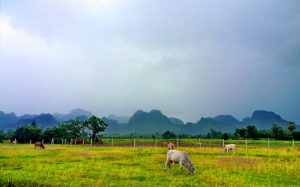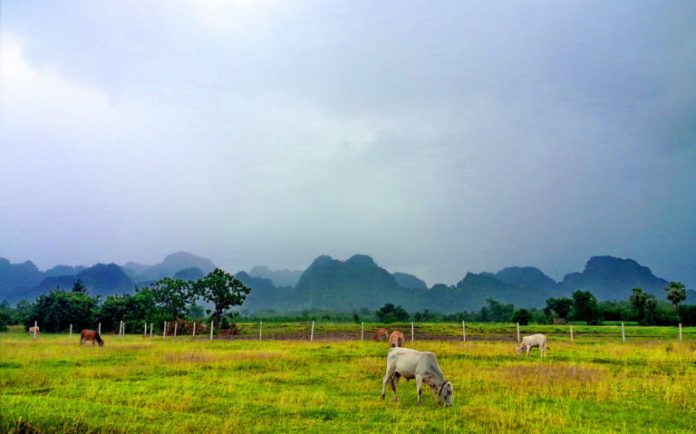Today, the Human Rights Foundation of Monland (HURFOM) celebrates World Environment Day. Villagers in Mon State and Mon areas of southeast Burma/Myanmar have strong economic, social, and cultural ties to their land and environment. Many villagers rely heavily on their surrounding environment to meet their daily livelihood needs, whether it is for farming, collecting water, or feeding livestock. It is with this knowledge that HURFOM calls for the promotion and protection of Mon State’s vast and resource rich environment. In doing so it seeks to draw attention to the concerns of villagers in Mon State and Mon areas of southeast Burma/Myanmar regarding environmentally harmful, large-scale development projects near their communities.
Over the past year, HURFOM has documented several development projects within Mon communities and their environmentally destructive practices. In July 2016, HURFOM published ‘Examining Foreign Direct Investment in Mon State,’ which looked at the increasing influx of foreign direct investment and large-scale development projects. This report highlighted coal mining and coal-powered projects, stone mining, gold mining, and the environmental impacts these projects have had in nearby communities. Communities reported the destruction of farming lands and water resources, as well as air pollution as some of the major consequences of these development projects. Furthermore, environmental damage often went hand in hand with health issues, as polluted resources negatively affected the health of nearby communities. These projects continue to raise concerns from local villagers regarding their effect on the environment.
 Stone mining is of particular concern to Mon villagers, as nearby residents report the damage to the environment is negatively impacting their daily lives:
Stone mining is of particular concern to Mon villagers, as nearby residents report the damage to the environment is negatively impacting their daily lives:
“When it rains, soil from the stone [limestone] mining washes away with rain and goes into the river. It kills sea [aquatic] life and the river becomes dirty causing us to get itchy skin. We normally use the water from the river, but now we try not to use it often as we are afraid to use it. When it rains, we use rain water, but summer is approaching and therefore there will not be as much rain and we are worried about not having enough drinking water.”
Nai B—, Kwan Ngan village, Kyaikmayaw Township, Mon State, 2016
Recently, the environmental consequences from a planned coal-powered cement factory in Pyar Taung area of Kyaikmayaw Township, Mon State, has also raised concerns and protest from local civilians. On February 18th 2017, over 2,000 locals from the Pyar Taung region demonstrated against the use of a coal power plant to provide electricity for the local cement factory:
“We would like to prevent the usage of coal power plants in our area. If the company MCL [Mawlamyine Cement Limited] was good, we wouldn’t need to demonstrate. It is also dangerous for the health of the community. If the factory affects our land and water, our community can’t accept this kind of factory in our community. The locals understand about the impact of using coal power; therefore, they demonstrate to stop the usage of coal power plants for the factory.”
Nai C—, Ka Don Si village, Kyaikmayaw Township, Mon State, 2017
It is not just the negative environmental consequences that concern villagers in Mon areas, it is also the lack of consultation and transparency by companies with affected communities. Many communities reported a lack of initial consultation, as well as misinformation about projects that are being operationalized nearby:
“When they [MCL] purchased the land, they only said that they were going to build a cement industry. They only explained the good side of the industry. They hid the negative impacts. And completely hid the fact that they would be using coal to fire the power plant. There was no discussion, information, or explanation about the environmental impact or impact on the people.”
Nai M—, Ka Don Si village, Kyaikmayaw Township, Mon State, 2016
Recommendations
Government, local administration, and political parties should:
• Make concrete efforts to enhance local villagers’ capacity to handle disputes, particularly by offering accessible legal counsel and financial skills trainings;
• Educate local people on the environmental impact from coal mining and coal power plants;
• Establish an Environmental Protection Agency to solve conflicts and inform local people about environmental issues;
• Eliminate corruption, ensure transparency, and provide access for local villagers in communities being affected regarding environmental impact assessments prior to project approval.
Investors active in Mon State should:
• Follow responsible conduct, ensuring that free, prior, and informed consent is sought from all parties and fair compensation for land and damages is paid. Where appropriate, investors must make the effort to translate any information into the Mon language when negotiating with local people;
• Coal power should be resorted to only if all other forms of generating electricity have been eliminated as viable options, and only upon the consent of the local community.
The International Community should:
• Call on the government to more fully commit to protecting the rights of farmers and local people in all cases;
• Promote responsible conduct by all foreign investors active in the Mon State region.
This article is written by HURFOM.

